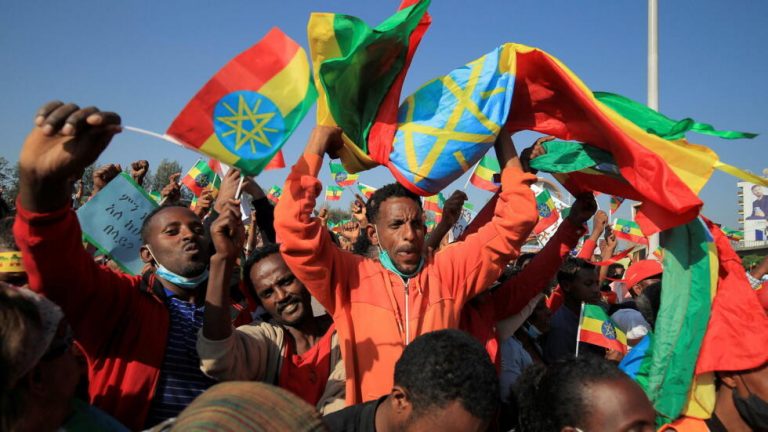Why Ethiopia is seven years behind rest of the world


On Wednesday, September 11, 2024, Ethiopia entered 2017 with fireworks and a concert headlined by Afrobeats star Davido. This New Year’s celebration, typically reserved for December by the rest of the world, left many non-Ethiopian netizens confused.
Amid the rise of deep fakes, videos of Davido performing in Addis Ababa, Ethiopia’s capital, while the East Africans rang in the new year might seem suspicious. However, Prime Minister Abiy Ahmed Ali confirmed the reality of the situation by tweeting “Happy New Year 2017” from his verified X account, seven years after the rest of the world did.
Ethiopia’s new year is celebrated on either September 11th or 12th in the Ethiopian calendar (Ge’ez calendar), which is seven to eight years behind the Gregorian Calendar, owing to alternate calculations in determining the date of the annunciation of the birth of Jesus.
Why does Ethiopia, despite being eight hours ahead of Eastern Standard Time in the United States except during Daylight Savings Time, during which Ethiopian time is seven hours ahead, use a calendar that lags seven years behind the Gregorian calendar? The answer lies in Ethiopia’s rich historical and religious traditions.
The Ethiopian Calendar Unveiled
Ethiopia follows its own calendar system, known as the Ethiopian or Ge’ez calendar. This system is deeply rooted in the ancient Coptic calendar and is closely tied to the Ethiopian Orthodox Church, which is one of the oldest Christian institutions in the world. The Ethiopian calendar is structured differently from the widely used Gregorian calendar: it has 13 months—12 months of 30 days each, and a 13th month, called **Pagumē**, which consists of 5 days in a common year and 6 days in a leap year.
The Ethiopian Embassy, in a statement on its website, posted in 2000(ie, 2007 to the rest of the world), revealed that the unique calendar is “Based upon the ancient Coptic Calendar, the Ethiopian Calendar is seven to eight years behind the Gregorian Calendar, owing to alternate calculations in determining the date of the annunciation of the birth of Jesus.
“The Ethiopian Calendar has 12 months of 30 days each, plus five or six additional days (sometimes known as the 13th month), which are added at the end of the year to match the calendar to the solar cycle.
“The year is currently 2000, according to the Ethiopian Calendar. Ethiopia celebrated the millennium at midnight on September 12, 2007. The year 2001 began in Ethiopia on September 11, 2008 of the Gregorian Calendar.”
Historical Origins
According to TimeAndDate, the Ethiopian calendar is based on the same astronomical calculations that lie behind today’s Gregorian calendar and its predecessor, the Julian calendar.
Despite being closely related to the Coptic and Julian calendars, it is not quite the same. It is based on the older Alexandrian or Coptic calendar, which is based on the even older Egyptian calendar, but like the Julian calendar, it adds a leap day every four years without exception and begins the year on August 29 or August 30 in the Julian calendar.
Reports suggest that the Ethiopian calendar’s unique timeline counts years from the **Anno Mundi** (AM) era, which places Christ’s birth about 5500 years after the world’s creation. In contrast, the Gregorian calendar follows the Annus Domini (AD) era. This fundamental difference in the starting point of the calendar year explains why Ethiopia’s calendar is out of sync with the Gregorian calendar.
Additionally, Ethiopia celebrates its New Year on September 11 (or September 12 in a leap year), diverging from the January 1 New Year’s Day observed globally. This date also reflects the Ethiopian adherence to the Julian calendar for determining the dates of Easter, further separating it from Gregorian practices.
Cultural Significance
The Ethiopian calendar is more than just a method of tracking time; it is a cornerstone of Ethiopian culture and identity. It influences religious observances, agricultural practices, and national festivities. For instance, **Enkutatash**, the Ethiopian New Year, marks the end of the rainy season and the start of the harvest period, celebrated with vibrant traditional ceremonies.
Religious practices are also dictated by the Ethiopian calendar, with unique feast days and fasting periods that differ from those in the Gregorian calendar. This calendar system helps maintain a cultural heritage that has been preserved for centuries, reinforcing Ethiopia’s historical and religious traditions.
Local Time, Business Hours, and Holidays
According to the US International Trade Administration, Ethiopia is in the GMT +3 hours’ time zone. Ethiopia follows the Julian calendar, which consists of twelve months of 30 days each and a 13th month of five or six days. The Ethiopian day starts at 6 a.m. (dawn) instead of 12 a.m. Ethiopians often quote meeting times that are six hours different than an international clock.
Converting Ethiopian Calendar Dates to Gregorian Calendar Dates
Ethiopian Calendar: Gregorian Calendar:
Meskerem (New Year) 11 September – 10 October
Tikimt 11 October – 9 November
Hidar 10 November – 9 December
Tahsas 10 December – 8 January
Tir 9 January – 7 February
Yakatit 8 February – 9 March
Maggabit 10 March – 8 April
Miyazya 9 April – 8 May
Ginbot 9 May – 7 June
Sene 8 June – 7 July
Hamle 8 July – 6 August
Nehasa 7 August – 6 September
Pagume 6 – 10 September





